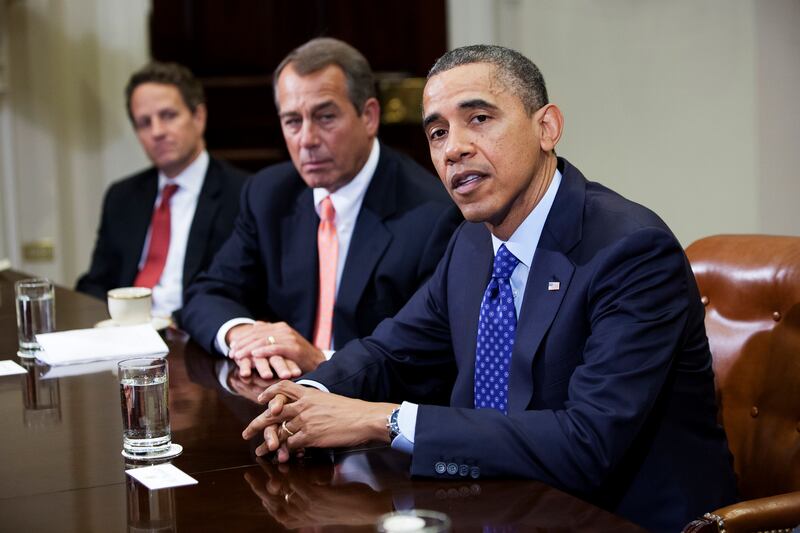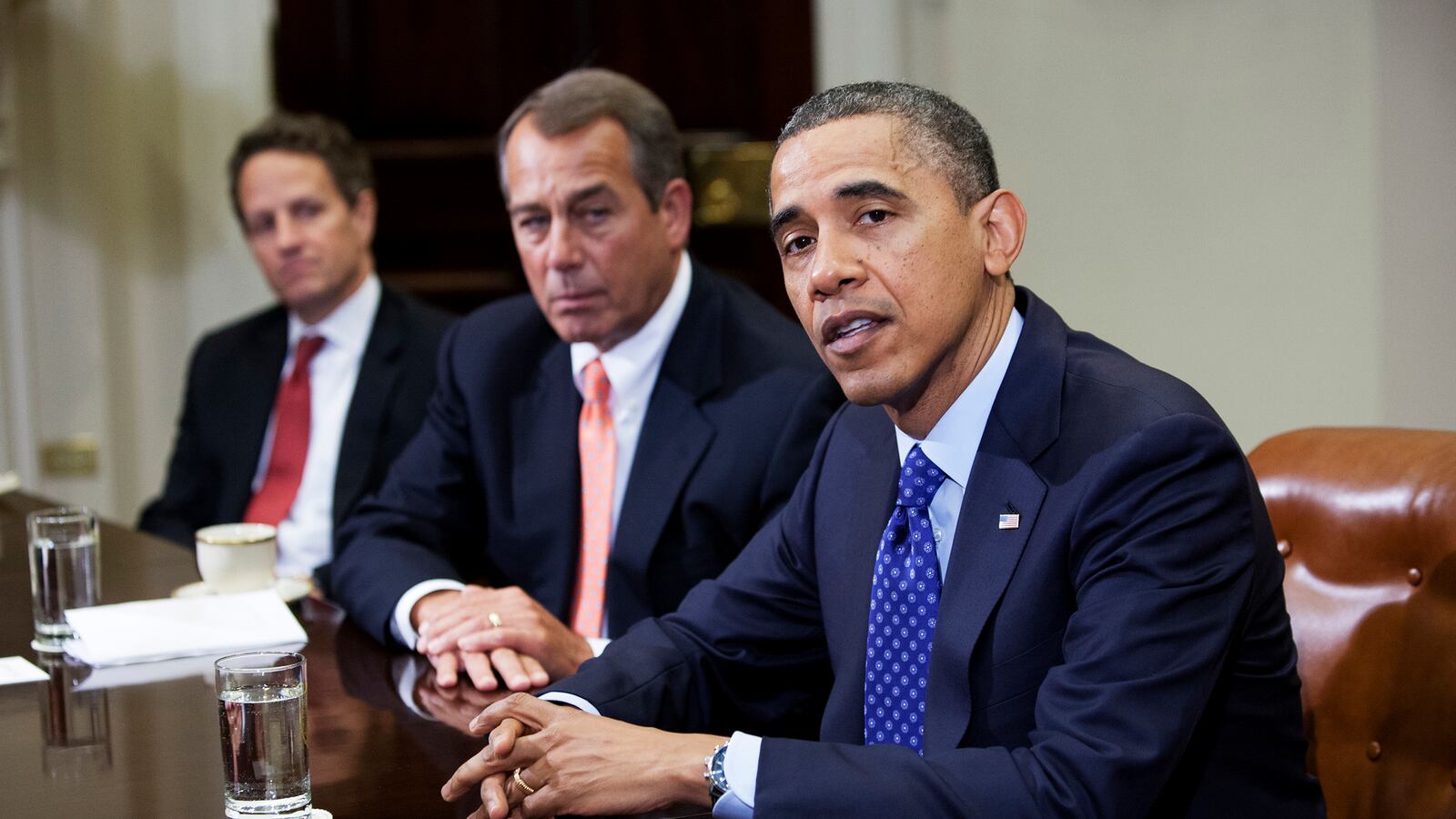Tuesday was Day 14 of the Fiscal Cliff Hostage Situation. With Congress out of session and most representatives heading home for Thanksgiving, there weren’t any formal talks. The presumption seems to be, however, that Congress and the White House will come together to make a deal before Jan. 1, thus preventing tax rates from soaring and feared automatic spending cuts from kicking in.

Most voices in official Washington earnestly assure Wall Street, the wealthy, and companies that they want nothing so much as to make a deal in the next several weeks. And we should take them at their word. But here and there, it’s possible to detect voices who are urging inaction. Some people, left, center, and right, believe careening over the cliff would be an affirmative good, a willful act of liberation, a step that is necessary to rationalize our tax code. I’ve dubbed these folks the Thelma & Louise Caucus. And I count myself a member.
Comparatively few members of Congress can be seen actively advocating for a lack of resolution. It’s frowned upon. But Sen. Patty Murray, the high-ranking liberal Democrat from Washington, isn’t afraid of the cliff. As Matt Yglesias of Slate points out, Murray in July spoke of the utility of going over the cliff in purely practical terms. In her view, the expiration of the Bush tax cuts establishes a new baseline of significantly higher rates, which would then make it much easier for Republicans to sign off on a tax cut deal. “We will have a new fiscal and political reality,” Murray said. “If the Bush tax cuts expire, every proposal will be a tax-cut proposal, and the pledge will no longer keep Republicans boxed in and unable to compromise.” And, in Murray’s view, this gives Democrats the upper hand. “If middle-class families start seeing some money coming out of their paychecks next year, are Republicans really going to stand up and fight for new tax cuts for the rich?” Without the cliff, there’s no prospect of a deal.
Other members of the Thelma & Louise Caucus believe the cliff is desirable for reasons of justice, not of tactics. Jonathan Cohn, the longtime reporter and Ann Arbor–based health-care maven at The New Republic, is the president of the Michigan chapter of the caucus. For Cohn, the cliff solves all sorts of problems. He never liked the Bush tax cuts to begin with and says we need the money. “I always thought that we should get rid of all the Bush tax cuts,” he said. “It seems to me the Clinton-era tax rates were just fine.”
Jonathan Chait of New York magazine, who is a native of Michigan and formerly worked at The New Republic, represents the realpolitik wing of the caucus. Even before the election, he was gaming out the smart politics behind a cliff dive:
“On the morning of November 7, a reelected President Obama will do … nothing. For the next 53 days, nothing. And then, on January 1, 2013, we will all awake to a different, substantially more liberal country. The Bush tax cuts will have disappeared, restoring Clinton-era tax rates and flooding government coffers with revenue to fund its current operations for years to come. The military will be facing dire budget cuts that shake the military-industrial complex to its core.”
Going over the cliff, Chait argues, will finally allow Obama to turn the tables on the obstructionist Republicans who have made his life hell for the past four years. And he will be able to give up trying to compromise with House Speaker John Boehner because the nature of the game changes. Obama and his crew, Chait writes, “understand something important, something that has not quite sunk in with wary liberals, obstinate conservatives, or split-the-difference deficit scolds: They no longer have to.”
Like Chait and Cohn, I have a Michigan connection and once worked at The New Republic. (Sense a trend?) And so I have volunteered for duty as recording secretary of the Tri-State Metro Area Chapter of the caucus. I’m not eager to see all the tax cuts expire, but I think the cliff does offer a rare opportunity to correct a historical error. The cuts introduced all sorts of harmful wrinkles and distortions into the tax code, in ways that privilege passivity over labor. There’s no earthly reason why capital gains and dividends should be taxed at 15 percent while wages for hardworking professionals are taxed at twice that rate. There’s no reason estates should be taxed at such low levels. There’s no reason carried interest—the wages private equity and hedge-fund managers effectively take for managing other people’s money—shouldn’t be taxed as income.
All these low rates were intended by their designers to be temporary—the better to mask their long-term cost. But because these tax cuts have powerful, well-connected constituencies, it has been difficult to slay them. Once we’ve gone over the cliff, the conversation about taxes will take on an entirely different tenor than the pre-cliff one. After a lost decade in the markets and the economy, advocates for the absurdly low rates of taxation on capital will have to make their case for lowering them again. Good luck to them.
The caucus is accepting membership applications from right of center. And at least one conservative has joined up. Former Bush staffer Marc Thiessen, heretofore known mostly to liberal circles as a defender of torture and as a middling Washington Post columnist, came out squarely for a cliff dive in his column on Monday. He did so because he believes it will help Republicans. “Today, the only ones in Washington who advocate fiscal cliff-diving are liberal Democrats,” he writes. “It’s time for conservatives to join them. Letting the Bush tax cuts expire will strengthen the GOP’s hand in tax negotiations next year, and it may be the only way Republicans can force President Obama and Senate Democrats to agree to fundamental tax reform.”
Thiessen does have some valid points. He notes, for example, that the fiscal cliff will bring about a range of outcomes that Democrats wish to avoid. “The 10 percent income tax bracket would disappear, so the lowest tax rate would be 15 percent,” he writes. The temporary payroll tax cut of the past two years will fade away. Lots more people, “many in high-tax blue states,” would get hit by the Alternative Minimum Tax. “The child tax credit would be cut in half, from $1,000 today to $500, and would no longer be refundable for most.”
Given all these goodies that are poised to disappear, the Republicans will have the post-cliff upper hand. “Instead of being in a ‘box,’ Republican leaders would have leverage again—something the Democrats want and would have to make concessions to get,” Thiessen writes. In addition, going over the cliff, rather than striking a grand pre-cliff bargain, would save Republicans from an act they hate doing even more than compromising with Obama, “having to break their pledge not to raise taxes,” he writes. “Raising taxes and losing a fight to stop automatic tax increases are two different things.”
So far, the members of the Thelma & Louise Caucus are a bunch of outliers. After a bitter election season, bipartisanship and comity are in vogue. Responsibility is the order of the day. CEOs are desperate for a deal that would clear up uncertainty (and spare them from having to pay higher taxes). We are supposed to root for functioning government over dysfunction, solutions over problems, deals over standoffs. Call the White House and you’ll have a hard time getting any of the policy wonks to say they’d be psyched to careen off the cliff.
But here’s the thing. If the cliff-averting deals were obvious and painless, they would have been concluded by now. And it’s just possible that the guy in the White House driving the vehicle, who is tired of an obstreperous Republican Party, who is flush with the adrenaline that only a victory can provide, and who will never run for office again, may be willing to put his foot on the gas instead of the brake.





